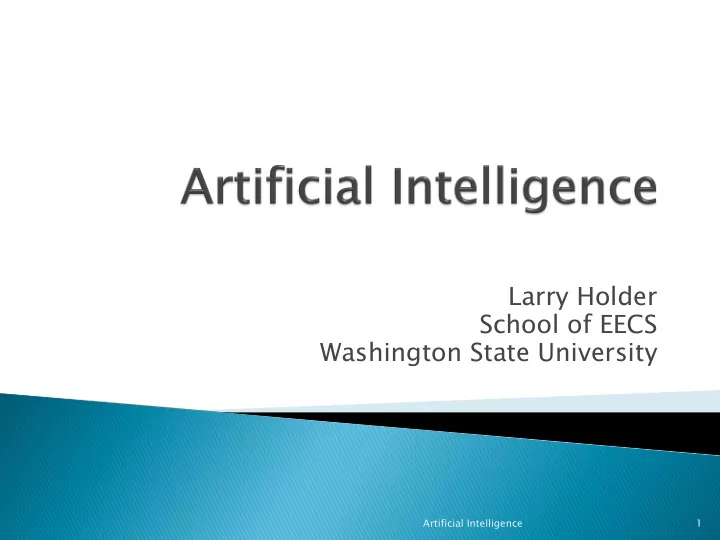

Larry Holder School of EECS Washington State University Artificial Intelligence 1
} Course information } Introduction ◦ Definition of AI ◦ Four approaches to AI ◦ Foundations and history of AI ◦ AI achievements ◦ Caution Artificial Intelligence 2
} Webpage: www.eecs.wsu.edu/~holder/courses/AI } Blackboard Learn (learn.wsu.edu) } Email (holder@wsu.edu) Artificial Intelligence 3
Readings: R&N Chapter 1 Artificial Intelligence 4
} John McCarthy, Dartmouth (1956) ◦ “The science and engineering of making intelligent machines.” } Intelligent? } What makes humans intelligent? Artificial Intelligence 5
} Ability to learn or understand or to deal with new or trying situations } Ability to apply knowledge to manipulate one's environment } Ability to think abstractly as measured by objective criteria (e.g., tests) Artificial Intelligence 6
} Acting humanly } Thinking humanly } Thinking rationally } Acting rationally Artificial Intelligence 7
} Turing Test ◦ Can the machine convince a human Alan Turing that it is human via written English (1912-1954) } Machine abilities? The Singularity Is Near (2012) } Loebner Prize ◦ wikipedia.org/wiki/Loebner_Prize Artificial Intelligence 8
} Building machines that mimic human cognition } “Cognitive Science” } How to capture human thought? Artificial Intelligence 9
} Laws of thought } Logic } Difficulties ◦ Expressing knowledge as logical formulae Define “chair”? Aristotle 384-322 BC ◦ Logical reasoning is hard (NP-Hard) If A is true, and A à B, then is B true? Artificial Intelligence 10
} Rational agent ◦ Acts to achieve the best outcome ◦ Encompasses other approaches } Focus of textbook (“a modern approach”) Artificial Intelligence 11
} IBM’s Watson competes against humans in Jeopardy! Game (2011) } Is Watson ◦ Acting humanly? ◦ Thinking humanly? ◦ Thinking rationally? ◦ Acting rationally? Artificial Intelligence 12
} Is DQN Breakout ◦ Acting humanly? ◦ Thinking humanly? ◦ Thinking rationally? ◦ Acting rationally? Artificial Intelligence 13
} Philosophy } Linguistics ◦ Logic, knowledge and } Neuroscience rationality ◦ Neuron, connectome } Mathematics } Psychology ◦ Algorithms, ◦ Human cognition computability, } Control Theory probability } Computer } Economics Engineering ◦ Utility and decision } Computer Science theory, games Artificial Intelligence 14
} Gestation of AI (1943-1955) ◦ Turing’s “Computing Machinery and Intelligence” ◦ Artificial neuron } Birth of AI (1956) ◦ John McCarthy ◦ Dartmouth Summer Workshop ◦ Newell and Simon’s “Logic Theorist” } Early enthusiasm, great expectations (1952-1969) ◦ Newell and Simon’s “General Problem Solver” ◦ Symbolic programming languages (LISP) ◦ Perceptron Artificial Intelligence 15
} “AI Winter” (1966-1973) ◦ Systems lacked commonsense knowledge, made simple mistakes Computer translation ◦ Most AI problems found to be intractable demo for US VP Ford in 1973. } Knowledge-based systems (1969-1979) ◦ Knowledge and uncertainty representation ◦ Expert systems (Ed Feigenbaum) } AI industry (1980-present) } Return of neural networks (1986-present) ◦ Multi-layer perceptron, back-propagation Artificial Intelligence 16
} AI adopts scientific method (1987-present) ◦ Empirical validation and theory } Emergence of intelligent agents (1995-present) ◦ Human-level AI ◦ Artificial general intelligence } Availability of “big data” (2001-present) } Deep learning (2010-present) Artificial Intelligence 17
} Game playing } Robotics } Planning and scheduling } Language understanding } Speech recognition } Big data } Deep learning } Vision Artificial Intelligence 18
} “AI is a fundamental risk to the existence of human civilisation.” ◦ Elon Musk, July 2017 } “… whose culmination is a world relying on machines ungoverned by ethical or philosophical norms.” ◦ Henry Kissinger, June 2018 Artificial Intelligence 19
} AI is the science and engineering of building intelligent machines ◦ I.e., machines that act rationally } Impressive achievements } Promising, challenging future Artificial Intelligence 20
Recommend
More recommend